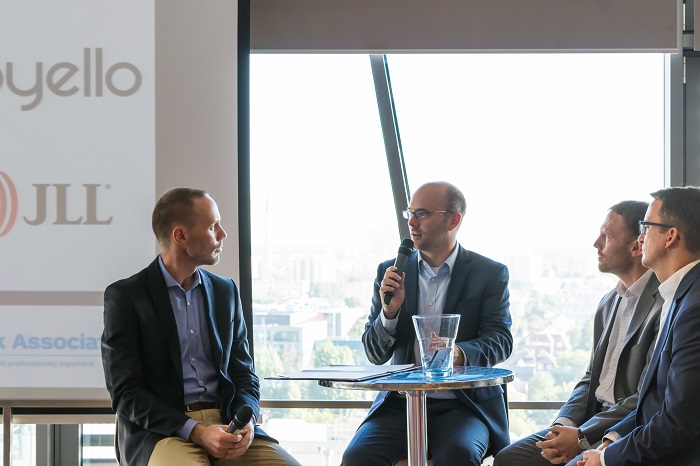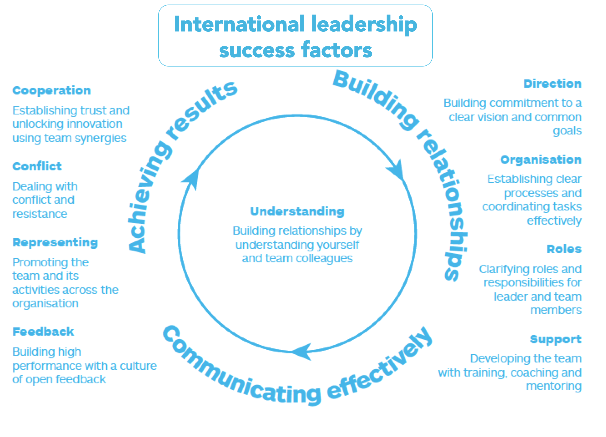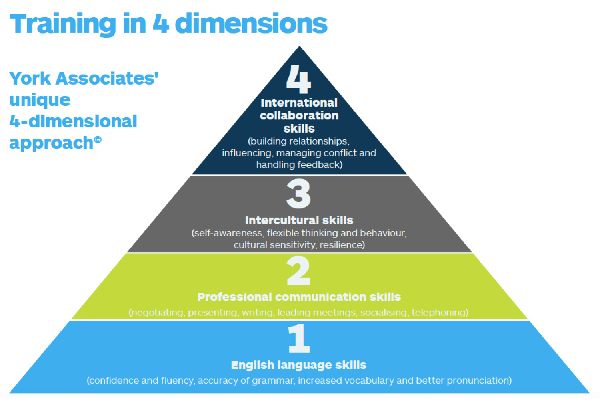The global labour market, of which Tri-City companies are a part – both corporations, start-ups and the entire SME sector (small and medium-sized enterprises) – is constantly growing. This contributes to various organizational changes in companies, it also causes changes in management styles and creates new needs for changes in the field of communication between people in international and virtual teams.
The two main challenges faced by people responsible for the implementation of processes in companies are: cultural differences, as well as the quality of language competences of employees and managers. Such a situation becomes an impulse to make new decisions to improve the quality and efficiency of the main areas of management.
On 21 September, the inaugural meeting of the “Let’s talk Business” series was held at Olivia Sky Club, the aim of which is to initiate a dialogue on the role and importance of effective communication for business development. We talk to the initiator of the series of meetings under this title – Paweł Banaszak, Communication Manager from “LEC Centre Spółka z o.o.” and Mike Hogan – Director of York Associates.
 Monika Bogdanowicz (Olivia Business Centre): How did you come up with the idea of a series of events on effective communication in a dynamically changing work and business environment, and what are your goals in this project?
Monika Bogdanowicz (Olivia Business Centre): How did you come up with the idea of a series of events on effective communication in a dynamically changing work and business environment, and what are your goals in this project?
Paweł Banaszak, Communication Manager, LEC Centre Spółka z o.o. – initiator of the “Let’s talk business” meetings that take place in Olivia Sky Club: For more than 20 years, we have been supporting our clients in learning foreign languages. We do this mainly by sending them to language courses abroad. Many of our clients want to be comfortable using a foreign language at work. And they’re getting better at it. But to communicate effectively in the world of international business, it is not enough just to have a good command of everyday language. The ability to combine language with typical business skills such as giving presentations, negotiating or conducting teleconferences is becoming increasingly important. In addition, there is an equally important sphere of awareness of cultural differences and their impact on the project, the work of the team, or business in general.
We have good relationships with educational institutions around the world. Thanks to them, we can not only send clients to courses abroad, but also invite experienced experts to Gdańsk to share their knowledge. We want to give knowledge to people who use languages in business, which is why we called the series “Let’s Talk Business”. We will invite foreign experts to the meetings to provide practical knowledge. One that anyone with international business relationships will be able to apply right away.
MB: How do you assess the scale of the challenges in the area of building relationships faced by managers responsible for the implementation of global business processes? What is the biggest barrier/problem that managers face?
One of the challenges faced by managers all over the world, not only in Poland, is to realize that the basis for success in international relations is not only the knowledge of a foreign language and management skills, but also the awareness of the importance of cultural differences. And it’s not just about “curiosities” about how a business card is served in Asia, or that Americans give very direct feedback. It’s about the importance of how the cultural baggage of team members affects team dynamics and effectiveness. The more cross-cultural interactions there are in a team or company, the greater the role this element plays. Awareness of this issue and knowledge in this area is needed not only by people working in large corporations. Startup founders who, for example, talk to investors, should also know the difference between building relationships with Asians and working with Europeans. On the basis of this knowledge, it is easier to build trust.
MB: How can we influence each other to understand each other well despite cultural differences, which often determine whether a given team or company has the possibility of success or is doomed to lack it?
I think there are two pillars of success in this regard. The first, basic one, is the awareness of cultural differences and their impact on business. It makes it easier to function in the business world. The basics of this awareness are acquired in business practice. An effective way to achieve the full use of the potential that lies in the conscious management of an international team is training conducted by experienced trainers. In this case, it is worth taking advantage of the opportunities offered by cooperation with foreign schools, because there is still little knowledge in Poland. The second pillar is trust. A manager who is aware of cultural differences, has competence in this area and knows how to listen to the people he works with will be able to effectively use these differences to build trust in the team. And this, according to the managers who took part in our panel during “Let’s Talk Business”, is the basis for effective communication and growth.
Monika Bogdanowicz (Olivia Business Centre): Communication and cooperation in international teams faces many obstacles and pressures that we face every day when entering into relationships with people we often do not know, do not see and do not understand their way of behaving. How do you help such managers and employees to do their job well and develop their companies?
Mike Hogan, Director, York Associates: Our mission is to support professionals who work in an international environment in more effective cooperation, leading to better results. It is based on the philosophy of the learning cycle, which consists of analysis, action and feedback. In this way, we help managers and their team members achieve high performance through continuous learning.
York Associates’ training in international leadership and team building is based on two approaches:
- Understand the 4 key challenges of internationalizing teams: uncertainty, complexity, paradox, and diversity.
- Build a strategy to manage 9 critical factors that affect the success of international leaders and teams:

The complexity of the processes that take place in international companies is primarily about building relationships and trust, which you call the pillars of professionalism in action. In your opinion, what are the best ways to develop these competencies in individuals and entire teams in companies?
When we ask business people about the essential factor that allows international teams and organizations to function perfectly, the answer is often only one word – “trust”. Trust is built ongoing, and to achieve it, leaders must be seen as competent, compliant, committed, empathetic, cohesive, and trusting in one another. My colleague Bob Dignen described these elements well in his book “Effective International Business Communication”. Collins).
MB: You are the head of York Associates, which has developed a unique formula of 4 scopes/pillars of language and communication skills education. Please describe the main assumptions of this method.
We believe that the purpose of our language courses is to help our clients communicate effectively in English. However, in order to be truly effective, we need to go beyond learning vocabulary, grammar and professional skills such as using English for meetings, presentations, etc. In addition to these skills, we look at the international context in which our clients communicate and help them develop the cultural sensitivity and international cooperation skills that are essential in international business. To better illustrate this approach, we have created a unique four-dimensional approach, which is described in the pyramid below:

MB: In your presentation during the meeting with the managers of Olivia Business Centre, you presented a very interesting description of the strategy and style of “push” and “pull” communication in order to achieve business goals. Which of these strategies and why do you think is more likely to be used in international teams and what makes it more effective?
It is impossible to say which of these two styles is the best in an international context. However, we should be aware of which style is natural for us and consciously consider whether this style will bring us closer to success and help us achieve the desired results, or whether it will hinder us. So, instead of using one style or the other, we need to be aware of the styles and needs of others, be flexible, and choose the one that is most appropriate for the situation.
We will invite you to the next meeting of the “Let’s talk business” series later this year.




